With the increased awareness of the importance of becoming a homeowner in Nigeria, the competitive nature of the real estate industry has led to more attempts to satisfy prospective buyers and investors than ever before.
Competition in the Nigeria Real Estate Economy
Recent trends have made customers swayed by the provision of incentives in a variety of forms, ranging from discounts on land prices to gifts attached to units purchased. Some offer a secure, self-sufficient environment for buyers, while others call out to investors with the promise of massive ROI.
The latest increase in competition among the active players in the real estate industry can be attributed to the increase in population in the last decade. According to statistics compiled by the Population Commission of Nigeria, the country witnessed an increase of more than 47 million people in the past decade, as the population increased from 158,503,197 in 2010 to 206,139,589 in 2020.

These statistics also revealed that, compared to previous years and decades, there are more people living in urban areas than in rural sections in 2020, with 107,112,526 people choosing the urban side versus 99,027,063 living in the undeveloped rural section. in nigeria. This contrasts with the 2015 statistics that revealed 86,673,094 urban residents and 94,464,354 rural inhabitants.
This population increase, especially in urban areas, has created a need for different sectors to catch up. In fact, this new trend benefits potential homeowners.
With the housing sector still running a deficit of around 17 million in the country, this presents a unique opportunity for the industry to grow beyond the rapid growth it is experiencing at a rate of 8.7 percent better than average GDP, according to accounting and auditing firm PricewaterhouseCoopers (PwC).
As it stands, the real estate sector will gain more speed by contributing beyond the 6.85% it is generating to the Nigerian economy from 2020, according to the budget. Of notable mention is Eko Atlantic City, a massive project that is expected to provide accommodation for some 450,000 people in Lagos upon completion.
This shows that investors are entering the industry and it can only get better.
Therefore, this is a call on the government to provide an enabling environment for the industry to prosper by improving the standard of living of the middle class that dominates the population. Finally, policies that favor investment must be implemented.
The real estate sector has been touted as a significant contributor to economic development in the wake of the decline of the oil sector. There can be no better time for the country to channel resources into the industry than now.








